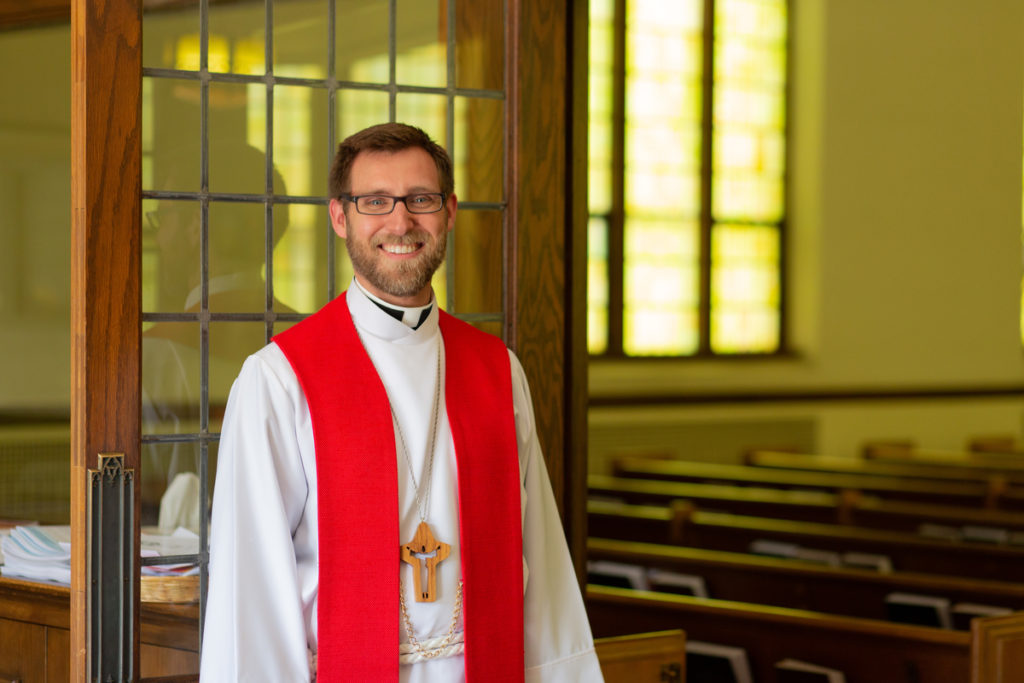Rev. Bill Moberly is the Founder & Director of Awakening Lives to World Missions, which exists to call, equi p and network congregations for more effective global outreach. ALWM draws on his 30+ years of experience in training churches across the US.
p and network congregations for more effective global outreach. ALWM draws on his 30+ years of experience in training churches across the US.
“The joy experienced during these months will never be forgotten,” he wrote, “the joy of telling people ‘The Old, Old Story,’ a story which they never before had heard. That joy cannot be described; it can only be experienced.” (Rev. Ralph D Hult, Lutheran pioneer missionary to Africa.)1 Those stirring words echo Jesus’ teaching in Luke 15:7 “I tell you that in the same way there will be more rejoicing in heaven over one sinner who repents than over ninety-nine righteous persons who do not need to repent.” The powerful stories of the thousands of Lutheran missionaries who served the predecessor bodies that formed the ELCA, going back to the first missionary sent in 1842, are rooted in this truth and the call that compels us to pray, send and go.
18 Then Jesus came to them and said, “All authority in heaven and on earth has been given to me. 19 Therefore go and make disciples of all nations, baptizing them in the name of the Father and of the Son and of the Holy Spirit, 20 and teaching them to obey everything I have commanded you. And surely I am with you always, to the very end of the age.”
Matt. 28:18-20
This is still the primary Global Mission task given to His Church by our Lord Jesus Christ: to go and make disciples of all the nations (ethne)! If your only frame of reference for global missions is the past generation, during the decline in the number of synodical Lutheran missionaries, and the increasing focus on the “accompaniment” mission model in the ELCA, it might surprise you to learn, for example, that China (including Hong Kong & Taiwan) and India have received more Lutheran missionaries since 1842 than any other country! Lutheran pioneer missionary efforts among the unreached and least reached over the decades have always included proclamation of the Gospel, discipleship, along with building schools, hospitals and other humanitarian efforts.
With my undergrad degree in history, I love looking at where we have been – both for the powerful stories of people living and serving – but also to learn from the past. When I heard for the first time in the early 1990’s about ‘accompaniment’ as the likely new ELCA global mission, I had just begun working more directly in global missions. In that role I was learning terms like ‘unreached people groups’ and distinguishing between the unreached and unevangelized. My first thought on ‘accompaniment’ was, ‘how can the more than three billion unreached people, where the church barely exists – if at all – ever invite us to accompany them?’ Nearly half of the world’s population, the “all nations” still needing to hear the Gospel, were ignored. So, let’s look back to 1988.
When the ELCA formed, there were more than 780+ long term missionaries serving the three predecessor synods: ALC, LCA and AELC. By 2002 the collective number had dropped to 166. This now also included long term and short term missionaries (1-2 years). Now, according to the ELCA:
“there are 240 missionaries in four categories:
- Long-term (usually four or more years)
- Global Mission two-year program
- Self-funded volunteer (varied length) – includes teachers and health care professionals
- Young Adults in Global Mission (usually one year)
Personnel positions in long-term service meet core programmatic needs in the ELCA’s global mission program… The number of long-term positions is limited” 4
The long-term pioneer missionaries of past generations – who learned the local language, adapted culturally and toiled continually to bring the Gospel to new ‘tongues, tribes, peoples and languages’ – are no more. What happened? Dr. Robert Benne put it this way:
“Convinced that all missionary activity was corrupted by western colonialism, the ELCA decided soon after its formation to forgo pioneer missionary efforts – bringing the Gospel to peoples who had never heard it before. Instead it opted for accompaniment, ie helping already established younger churches in whatever way they determined. While accompaniment itself is a noble enterprise, the refusal to carry the Gospel to those who have never heard it was a direct repudiation of the Great Commission. The number of missionaries plummeted, while social service helpers increased.” 5
The number of missionaries declined sharply, and the core task also drastically changed. The words of Rev. Hult, above, stand in sharp and disheartening contrast to the words of another Lutheran missionary written nearly a century later:
“My job as a missionary in the Evangelical Lutheran Church in America is not to convert anyone to anything. The ‘accompaniment model’ for missionary work, to which we subscribe, is defined as walking together in solidarity, practicing interdependence and mutuality.” 2
“I usually associate evangelism with an effort to convert nonbelievers to Christianity, something that makes me very uncomfortable. Too often the desire to bring about conversions grows out of a belief that nonbelievers need to be ‘saved’ from eternal damnation by adopting the Christian faith. To the extent that evangelism is about ‘saving souls,’ I want nothing to do with it. I approach matters of faith and belief with humility, unwilling to assert the superiority of my own religious beliefs over those of others.” 3
The ELCA describes it this way, in the Living Lutheran at their website, in a post that has since been removed:
“Today, missionaries with the ELCA serve in 48 countries. . .Most missionaries from Europe and North America are now lay people with special expertise, rather than clergy intent on conversion.”
Essential to finding your way when you’re lost is knowing where you are, and how you arrived there! Although many reading this may not agree at all with the loss of evangelism and pioneer missions, or some of the startling statements, the truth is that in many Lutheran congregations global missions has diminished, and in some cases virtually disappeared. That is the tragic ‘new normal’ that has emerged in many churches after nearly 30 years of accompaniment, and a global missions decline that can be traced, in fact, back into the 1960’s. I don’t write here to cast blame or point fingers. Those persuaded that missions = colonialism, or church members in our pluralistic age that believe that all religions are roads to the same God, are probably happy with the state of things.
On the other hand, there also many of us who want our congregations to return, in words and in actions, to the priority of Jesus’ global mission mandate! Rev. August Carlson, pioneer Lutheran missionary to India, anticipated a time like ours today when global missions would diminish. He urged the publication of a periodical solely on missions, “expressing the fear that missionary information might otherwise eventually come to be relegated to a less important place and missions itself come to be looked upon as secondary in importance”.6
The path forward for us is always found as we return to the Word of God and the Lord of the Church! Jesus said, “I am the way and the truth and the life. No one comes to the Father except through me.” (John 14:6) The resurrected Jesus Christ said, “But you will receive power when the Holy Spirit comes on you; and you will be my witnesses in Jerusalem, and in all Judea and Samaria, and to the ends of the earth.” (Acts 1:8). Jesus’ command to HIS church is still to go and make disciples of all the nations! This still starts in our congregations: in our worship, Sunday school, in teaching, in our gatherings of various kinds, and when our members, councils and teams meet to pray and plan. Every congregation – rural or urban, large or small – is to be purposefully and personally engaged in helping fulfill the global great commission. We are called to be actively engaged as prayers, givers and goers. After the effects of the last generation, in many churches it may have been so long that you don’t remember how or where to start. To put it another way – the fact is that ‘we don’t know what we don’t know’. But ignorance as people and congregations in knowing how to genuinely answer God’s call to the nations is not bliss. Resources exist, the Lord is calling, and people are still waiting to hear the ‘old, old story’ of forgiveness and life in our Lord and Savior Jesus Christ!
[For assistance with evaluating and energizing your global missions ministry, write Pastor Moberly at [email protected]]Footnotes
1 -Three missionary pioneers and some who have followed them
by Swan Hjalmar Swanson p. 120
2-(https://www.thedailybeast.com/no-talk-no-peace-how-israels-separation-barrier-cuts-off-the-conversation0 – Sept, 2013
3 –https://www.exposingtheelca.com/exposed-blog/archives/10-2013 The original quote from the Living Lutheran, used in the article footnoted here, is no longer available at the ELCA website
4: Where We Work – Evangelical Lutheran Church in America (elca.org)
5 – [https://www.atlantic-nalc.org/about/our-history/] by Robert Benne.
6 -Three missionary pioneers and some who have followed them by Swan Hjalmar Swanson p. 33.



















